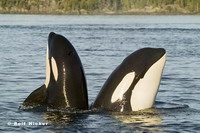Biologists attract lost whales back to Pacific
American biologists relied on an underwater recording of humpback whale songs Thursday to lure two injured whales back down the Sacramento River and toward the ocean, 90 miles (144.8 kilometers) away.

It could take weeks to get the whales back where they belong, scientists said. Still, hundreds of people lined the river to watch as the songs began to play from a U.S. Coast Guard boat Thursday morning.
The biologists hope the salty water and ample food of the Pacific will speed the recovery of the two whales, believed to a mother and calf. Both were wounded during their inland detour.
To get the whales headed in the right direction, researchers with the Marine Mammal Center planned to play the songs and use boats lining the channel to try to prevent the two from turning around.
"We're going to be playing the sounds of humpback whales feeding," said Bernie Krause of Wild Sanctuary. "It's like the dinner bell."
The whales, first spotted Sunday in the lower Sacramento River, likely were on their northward migration from Mexico up the California coast when they were sidetracked, biologists said. Because they are at the end of their hibernation season, they have less blubber to rely on for fuel than they would later in the summer or fall.
Photos revealed that they had been wounded, likely by a ship's propeller, said Frances Gulland, director of veterinary science at the center. If they can be returned to their natural sea water habitat, which is cleaner than the fresh water in the port, they likely will not need treatment, researchers said.
Shipping and small boat traffic were halted in the basin, which is 30 feet (9 meters) deep and 200 feet (60 meters) wide. The next ship was not expected to dock for another week, giving authorities time to try to escort the whales back to the Pacific, said Teresa Bledsoe, administrative clerk at the Port of Sacramento.
It is unusual for whales to reach so far into the Sacramento-San Joaquin Delta, but it has happened before. In 1985, a humpback nicknamed Humphrey was escorted back to sea after swimming in the delta for nearly a month.
One concern for the whales' trip is the murky water and many estuaries of the delta, a vast network of rivers and canals that drains two-thirds of California's land mass. Scientists fear they could lose track of the whales and said they were considering marking them with locator tags.
Subscribe to Pravda.Ru Telegram channel, Facebook, RSS!




